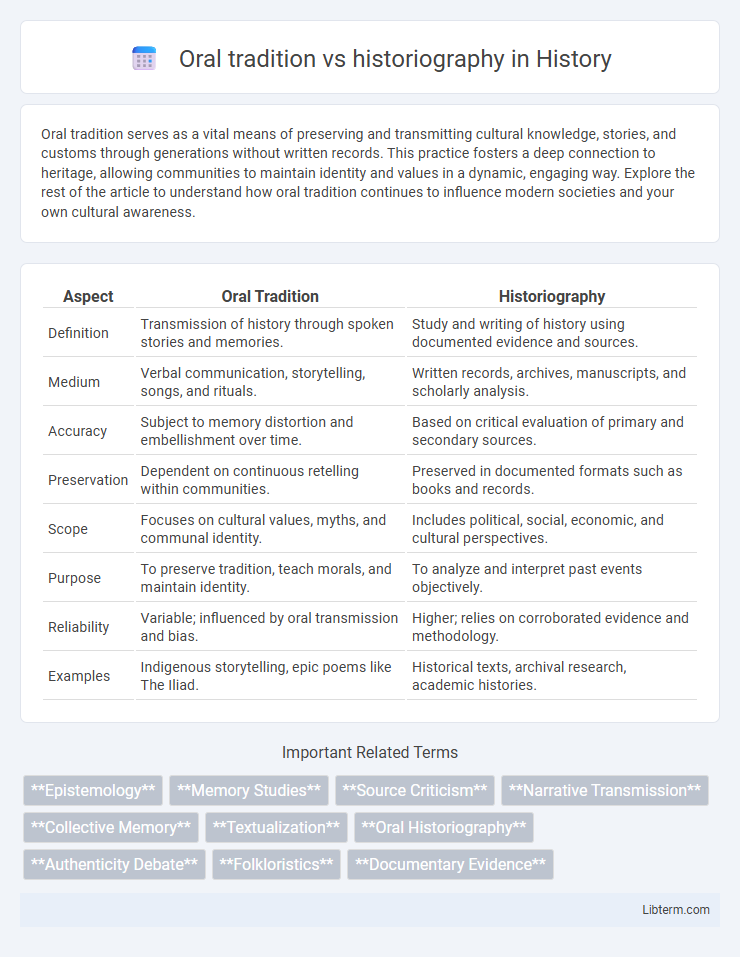Oral tradition serves as a vital means of preserving and transmitting cultural knowledge, stories, and customs through generations without written records. This practice fosters a deep connection to heritage, allowing communities to maintain identity and values in a dynamic, engaging way. Explore the rest of the article to understand how oral tradition continues to influence modern societies and your own cultural awareness.
Table of Comparison
| Aspect | Oral Tradition | Historiography |
|---|---|---|
| Definition | Transmission of history through spoken stories and memories. | Study and writing of history using documented evidence and sources. |
| Medium | Verbal communication, storytelling, songs, and rituals. | Written records, archives, manuscripts, and scholarly analysis. |
| Accuracy | Subject to memory distortion and embellishment over time. | Based on critical evaluation of primary and secondary sources. |
| Preservation | Dependent on continuous retelling within communities. | Preserved in documented formats such as books and records. |
| Scope | Focuses on cultural values, myths, and communal identity. | Includes political, social, economic, and cultural perspectives. |
| Purpose | To preserve tradition, teach morals, and maintain identity. | To analyze and interpret past events objectively. |
| Reliability | Variable; influenced by oral transmission and bias. | Higher; relies on corroborated evidence and methodology. |
| Examples | Indigenous storytelling, epic poems like The Iliad. | Historical texts, archival research, academic histories. |
Understanding Oral Tradition: Definition and Scope
Oral tradition refers to the practice of transmitting cultural knowledge, stories, beliefs, and history through spoken word across generations, often encompassing myths, legends, and folklore. This method relies on memory, performance, and communal participation, contrasting with historiography which systematically records history through written documents and critical analysis. Understanding oral tradition involves recognizing its dynamic nature, social context, and role in preserving collective identity where formal written records may be absent or limited.
The Nature of Historiography: Methods and Approaches
Historiography employs critical analysis, cross-referencing, and sourcing to construct accurate historical narratives, contrasting with oral tradition's reliance on memory and verbal transmission. Methods in historiography include examining primary documents, assessing bias, and contextualizing events within broader social and political frameworks. These systematic approaches ensure a robust, verifiable record of history compared to the fluid and interpretive nature of oral traditions.
Sources and Transmission of Oral Traditions
Oral tradition relies on spoken word, memory, and communal performance to transmit stories, histories, and cultural knowledge across generations, without reliance on written records. Sources of oral traditions include myths, legends, folk tales, songs, and proverbs, often preserved and altered through mnemonic devices and repetition within communities. Transmission occurs through direct verbal interaction, apprenticeship, and ceremonial contexts, making oral histories dynamic but potentially variable compared to the fixed documentation found in historiography.
The Evolution of Written Historiography
The evolution of written historiography marked a significant shift from oral tradition by establishing permanent, verifiable records that capture complex historical narratives with chronological precision. Unlike oral tradition, which relies on memory and communal retelling, written historiography enables the critical analysis of sources and the inclusion of diverse perspectives through texts such as Herodotus's "Histories" and Thucydides's "History of the Peloponnesian War." This transition facilitated the preservation of detailed historical events, institutional memory, and evidence-based inquiry, laying the foundation for modern historical methodology.
Strengths of Oral Tradition in Preserving History
Oral tradition excels in preserving history by facilitating the transmission of cultural knowledge, values, and social norms through generations without reliance on written records. It offers a dynamic and adaptable narrative structure that allows communities to maintain collective memory and identity, especially in societies with limited literacy. Oral tradition captures diverse perspectives and emotions, providing rich contextual insights that often complement the factual focus of historiography.
Limitations and Challenges of Oral Narratives
Oral traditions face limitations such as memory distortion, selective retelling, and the absence of corroborative evidence, which complicate their reliability compared to written historiography. Challenges include the transmission of narratives across generations, cultural biases, and the influence of contemporary values altering original accounts. These factors often hinder the precise reconstruction of historical events and require critical cross-examination with archaeological and textual sources.
Objectivity and Reliability in Historiographical Records
Oral tradition relies on communal memory and storytelling, which can introduce variations and subjective interpretations over time, impacting its objectivity and reliability. Historiographical records, by contrast, employ systematic evidence collection, source criticism, and cross-referencing to enhance accuracy and minimize bias. The rigorous methodologies in historiography contribute to more objective and reliable historical accounts compared to the fluid nature of oral narratives.
Influence of Culture and Memory on Oral Traditions
Oral traditions shape historical narratives through the collective memory and cultural values of a community, emphasizing stories that reinforce identity and social norms. The fluidity of memory allows oral histories to adapt over time, reflecting contemporary cultural influences and priorities rather than fixed chronological events. This contrasts historiography, which prioritizes documented evidence and critical analysis, aiming for objectivity in reconstructing past events.
Comparative Analysis: Oral Tradition vs. Historiography
Oral tradition preserves historical knowledge through storytelling, song, and memory, emphasizing communal values and cultural continuity, while historiography relies on written records, critical analysis, and empirical evidence to construct factual narratives. Oral tradition offers fluid, adaptable accounts influenced by collective memory but can lack precise chronological order and verification, whereas historiography prioritizes accuracy, source critique, and chronological coherence. Comparative analysis highlights how oral tradition maintains cultural identity and subjective interpretation, whereas historiography seeks objectivity and reproducibility in historical documentation.
Integrating Oral Tradition with Modern Historical Methods
Integrating oral tradition with modern historiography enhances the depth and accuracy of historical narratives by combining firsthand cultural memories with empirical evidence. Oral testimonies provide unique insights into events and social practices often absent in written records, enriching historical analysis with diverse perspectives. Utilizing interdisciplinary approaches such as ethnography, linguistics, and archaeology enables historians to validate and contextualize oral accounts, bridging the gap between narrative preservation and academic rigor.
Oral tradition Infographic

 libterm.com
libterm.com